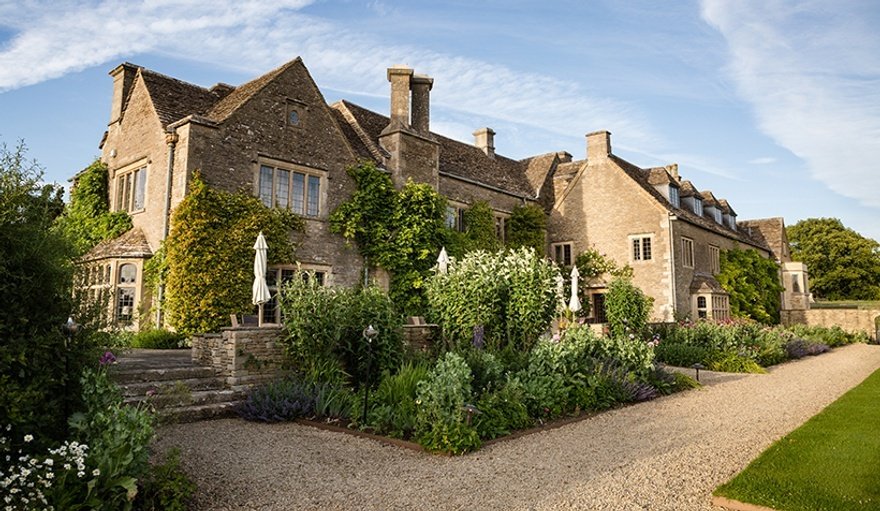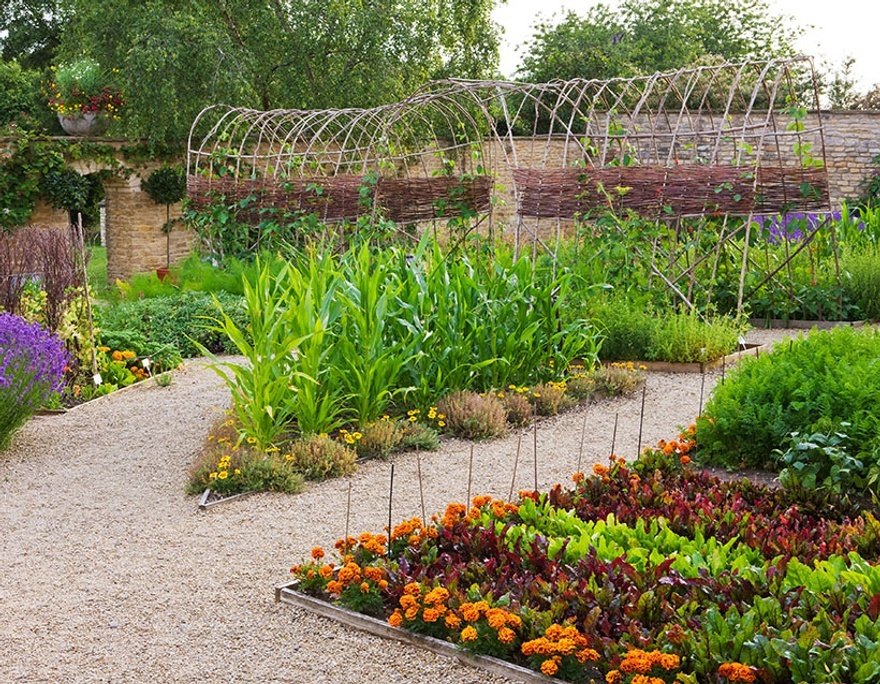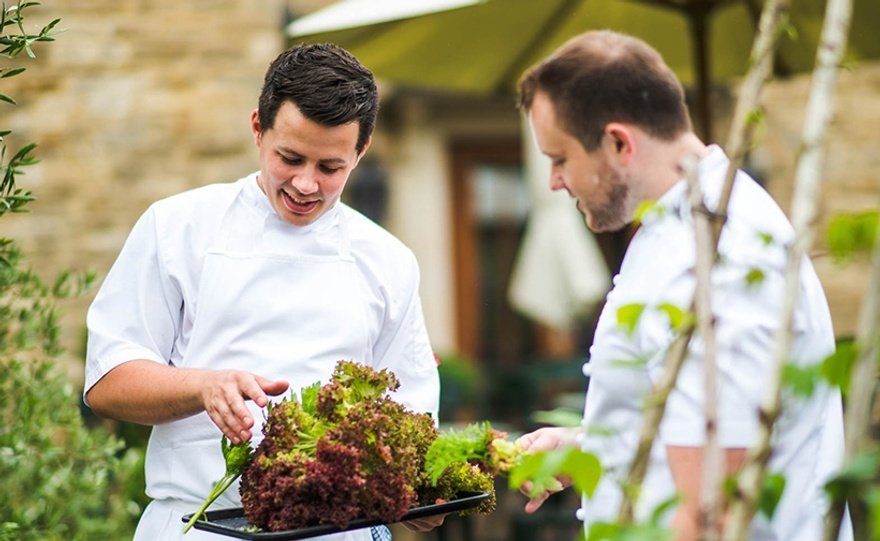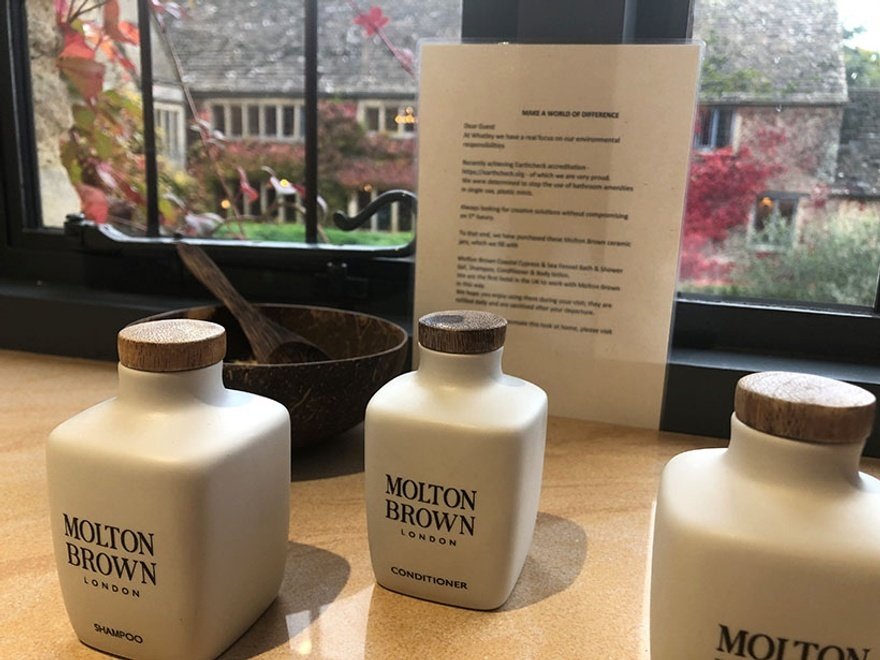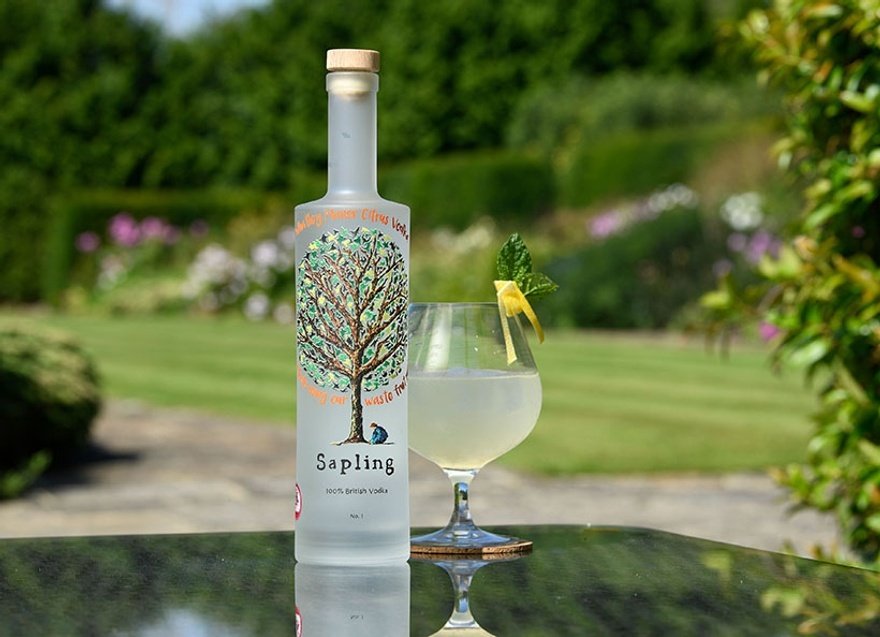Sue Williams, general manager of Whatley Manor, is not only winner of the 2021 Sustainable Business Award Catey, she has also spent lockdown studying how to improve her already admirable green efforts. Amanda Afiya discovers why she's imploring all hoteliers to adopt a similar approach.
Sue Williams is unquestionably one of the most respected hoteliers in the UK. As well as being winner of the 2017 Hotelier of the Year Award, she's a prominent Master Innholder, chairman of Pride of Britain Hotels, and, earlier this month, she added another trophy to her cabinet when Whatley Manor, the five-red-AA-star hotel and spa that she has deftly steered for the past five years, clinched the Sustainable Business Award at the 2021 Cateys.
For the past two years, the impassioned environmentalist has been driving the green agenda at the Malmesbury-based hotel in a bid to achieve net-zero emissions well before the end of this decade. That ambition received a massive shot in the arm earlier this year when Williams enrolled on the University of Cambridge's inaugural Business and Climate Change: Towards Net Zero Emissions course, run by its Institute for Sustainable Leadership. The nine-week course, completed at the end of April, was delivered to 290 students from around the world; Williams was the only hotelier.
Athough it was intense, hard work, it was an invaluable way to spend lockdown, says Williams. "I had got to a point where I recognised that I needed more tools to be able to talk about the subject in a more meaningful way, and to grow my knowledge even further. Prior to this, my focus had been on hospitality and sustainability, but I wasn't looking at the wider environmental and community pieces that sustainable practices entail. I wasn't looking at the subject from a global perspective.
"My studies were a real eye-opener to the levels of climate injustice in the world. I had little comprehension of the scale to which people's lives were being affected by climate-related poverty, malnutrition and by forced migration. It made me realise that those who have emitted the least emissions are suffering the most. We, in the rich countries, are yet to feel the worst effects, but we are not exempt, we are starting to experience it too, and this is set to rapidly increase."
Top marks
This year's lockdown enabled Williams and two of her non-furloughed team members to push through the workings of her final assessment based around creating a decarbonising business strategy for the 23-bedroom property. In April, Whatley Manor was awarded a five-out-of-five Globe rating from EarthCheck, the world's number one scientific certification and advisory group for the travel and tourism sector, responsible for benchmarking the hotel's annual performance against stringent criteria.
"When embarking on this journey, it is key to find the right partners to support you," explains Williams. "We work with NOW Sustainability, EarthCheck, the Sustainable Spa Association and the Sustainable Restaurant Association, and we cannot thank them enough for all their help and guidance."
Newly created goals, which include a vision to become an environmentally responsible hotel, restaurant and spa that helps to "achieve a cleaner, safer and healthier world for ourselves, our families and for future generations" were unveiled, and deadlines were put in stone.
We recognise that this is a difficult journey for all businesses, and we hope to bring all suppliers on the journey with us. But we recognise that we might lose a few along the way
By 2025, the team at Whatley Manor aim to be recognised as environmental-positive influencers in the industry by being both collaborative and a force for good, and by delivering evidence-based results centred around key Sustainable Development Goals (SDGs), as set out by the United Nations. By 2026, the hotel and spa plans to have reduced its carbon footprint by 75%, compared to figures from 2017, and, by 2028, Whatley Manor's ultimate objective is to achieve net-zero emissions.
With some solid, sustainable practices already under its belt, recognised last year by the award of a green Michelin star, no less, and with audacious ambitions on the horizon, it's easy to see why Whatley Manor was this year's victor of the coveted Catey. But the hotel's strategy, wholly endorsed by the property's owners Alix and Christian Landolt, goes well beyond its beautifully appointed, Cotswold-stone walls – this is a strategy that could (should, even) run through the heart of every hotel business in the UK.
"There are people in our industry that I'm incredibly fond of, that I really respect, who say ‘well, it's not my problem, Sue' or ‘I'll be retired by then'. Well, I might like to be retired in the next five years, but we've got a responsibility – we've created the problem. I could be the first to take that stance because I don't have children; I could just carry on in my own selfish way, but it's inherently wrong and the planet is dying.
Sustainability now underpins every stage of decision-making for the business. It is a primary hotel and employer brand value. Think of any function in the business and it is either being considered or has already been changed."
The green team
Fresh from her studies, Williams quickly established a dedicated environmental taskforce made up of employees from all departments, led by Williams and the hotel's sustainability co-ordinator Kate Church. The taskforce meets every six weeks to share ideas and progress, and to take on new research or projects. It also constantly reviews and looks to improve decarbonising measures, which are then conveyed to the broader team via noticeboards, newsletters, on a display screen in the staff room, and on the staff Facebook page.
Church's role is to continually drive the hotel's sustainability performance, from its community initiatives to monitoring energy, waste and water consumption, as well as seeking alternative suppliers with the best sustainability credentials. Without doubt, this has been the team's greatest sustainable challenge to date.
"Having identified that 37% of our carbon is generated from the supply chain, a great deal of our focus is working closely with our suppliers," says Williams. "We recognise that this is a difficult journey for all businesses, so we want to share knowledge and collaborate and we hope to bring all suppliers on the journey with us. But we recognise that we might lose a few along the way."
Williams points to Lavazza as a good example of a supplier with great credentials. "The company's most sustainable bean is Colombian, and North Colombia, on the border with Venezuela, was an area that had been taken over by drug barons, who forced farmers off their land and replanted the land to produce cocaine," says Williams.
"The government has now managed to take back that land and deal with the drug problem in that region and, working with Lavazza, they have brought the families back, helped them to replant coffee, and now they are making a sensible living working with Lavazza. The company also helps with welfare for the growers and education of their families. This reflects a commitment to the UN Sustainable Development Goals 5, 8, 12 and 13.
"In addition, Lavazza works with Eversys coffee machines, which are designed in the circular-economy mode. They've taken recycled materials into modular form so that when a machine breaks down, components can easily be replaced. It's designed in such a way that it just takes its life forward, if you like, and it doesn't end up in waste. I love that story – it's a common-sense approach."
Starting small
Meanwhile, the removal of plastic and packaging by some suppliers has reduced Whatley Manor's general waste bins from 14 to just four a week, and with each 1,100-litre-bin costing £14.10 to remove, the property now saves more than £7,000 a year on general waste removal. In conjunction with this approach, the bin area has been redesigned and renamed "our recycling centre" with clear signage and instructions, helping to embed a responsible waste management culture within the team.
A switch to local auditors, employing the services of a business that operates a paperless office, runs on renewable energy and boasts an electric fleet, has been equally rewarding. Likewise, the hotel's accounts office is also now a paperless operation with invoices, payslips, contracts and audits all being produced digitally. Important documents use E-sign. Whatley Manor is also in the throes of seeking a new bank as many of the major high street banks invest in fossil fuels, says Williams, who hopes to move to ethical bank Triodos.
Last year, apart from the Covid requirement of needing to supply guests with safety items such as masks, guest bedrooms became 100% free of single-use plastics. This was achieved with the help of Molton Brown, which now produces bespoke refillable ceramic pots for Whatley's bathroom amenities, and full-size toiletries have been replaced with refillable glass bottles in public areas. The process has removed 26,000 50ml plastic amenity bottles from the hotel's waste.
Food waste, the world's third-highest emitter of methane, is a top focus for hospitality businesses to mitigate, says Williams. Niall Keating, executive chef at the hotel, including its two-Michelin-starred restaurant, works closely with suppliers and producers in the writing of his menus to minimise waste. Menus now only offer line-caught fish and meat procured from organic, local farmers, and there is a strong focus on vegetarian options alongside a vegan menu.
Feedback from customers has been entirely positive, Williams says. "We've not had a single negative on our changes – in fact, guests have been commending us for our actions. It's not about ramming sustainability down their throats, it's omnipresent. We reference the subject on the pre-arrival emails, we suggest things that guests can do while they are with us, such as electric bike safaris and wellness-orientated activities. We're making suggestions that ‘while you're here, why don't you park your car and leave it here for the duration of your stay?' so that people consider their footprint."
Sustainability now underpins every stage of decision-making for the business. It is a primary hotel and employer brand value
Of course, one of the few advantages of the pandemic was the removal of hotel touchpoints. "It made us declutter the house and it made us realise there are a number of things we don't ever want to go back to, such as the provision of copious amounts of glossy magazines in the bedrooms. We now just have National Geographic, which is entirely on-message."
And are the guidebooks on this supplier journey? "That's where I'm up to, really. Some are not doing anything, and, if I'm being true to my strategy with the supply chain, why would I continue to work with those that aren't thinking of the planet? What we want outside our front gate is an EarthCheck plaque so that we're seen as an EarthCheck-certified destination. That's what we would be supremely proud of once we achieve full accreditation."
Getting suppliers on side
Earlier this month, Whatley Manor hosted a supplier workshop to share and discuss the hotel's vision, mission statement and goals.
"It was great to see the suppliers so engaged about the challenge ahead," says Sue Williams. "It was clear that some of them were already doing great work, but, as yet, few have found a way to achieve external accreditation to verify their work. Also, I found that few were shouting about their efforts as a marketing tool.
"Unfortunately, polystyrene remains impossible to recycle easily and in a carbon-friendly way, and no one has yet to find an alternative that will do the same job of ensuring the quality of the fresh produce." Logistics and costs are still a great hindrance for suppliers, adds Williams, but everyone truly understood how important this journey is to Whatley Manor. "They could see why it is necessary for businesses to make changes to their approach to stay relevant and viable in the future."
A taste of waste
To mark Zero Waste Week 2021, which took place last month [6-10 September], Whatley Manor partnered with new kid on the block, Sapling Spirits, to launch a vodka infused with lemon and orange peel, using fruit from the hotel's kitchen that would normally go to waste.
Whatley Manor Citrus Vodka is Sapling's first bespoke blend for a hotel and restaurant, and the spirits company chose to work with Whatley because its impressive green credentials aligned with the supplier's own values and goals. For every bottle of Sapling vodka sold, Sapling plants a tree.
The kitchen brigade at Whatley Manor collected 10kg of citrus fruit, which was then distilled and prepared for use in the vodka. The first batch of waste citrus has created 500 bottles of vodka, which are available to buy directly on the Sapling website at £38, as well as in the hotel's boutique. The 40% ABV vodka is gluten-free, and the flavour comes purely from the waste citrus fruit, with no added sugar or artificial flavourings.
A cocktail, the Whatley Manor Citrus Drop, has been created to celebrate the collaboration, which also features honey from Whatley's own beehives.
To reduce the carbon footprint and to ensure that Whatley Manor Citrus Vodka is as sustainable as possible, Sapling Spirits used local distillery Wood Brothers Distillery, sourced especially for this project. The family-run business is just 35 miles from the hotel and offers an eco-refill option.
Sapling's tree-planting projects are in communities where the trees will have a positive impact. For example, the company is championing an urban planting scheme in London, which has seen fruit trees spring up in central locations such as Elephant & Castle. Sapling has planted 23,306 trees so far. The vodka itself is made in the UK using 100% British non-GMO wheat, and is distilled four times using charcoal-filtered, de-ionised water.
Continue reading
You need to be a premium member to view this. Subscribe from just 99p per week.
Already subscribed? Log In

